Spirituals is a genre of Christian music that is associated with African Americans, which merged varied African cultural influences with the experiences of being held in bondage in slavery, at first during the transatlantic slave trade and for centuries afterwards, through the domestic slave trade. Spirituals encompass the "sing songs", work songs, and plantation songs that evolved into the blues and gospel songs in church. In the nineteenth century, the word "spirituals" referred to all these subcategories of folk songs. While they were often rooted in biblical stories, they also described the extreme hardships endured by African Americans who were enslaved from the 17th century until the 1860s, the emancipation altering mainly the nature of slavery for many. Many new derivative music genres such as the blues emerged from the spirituals songcraft.
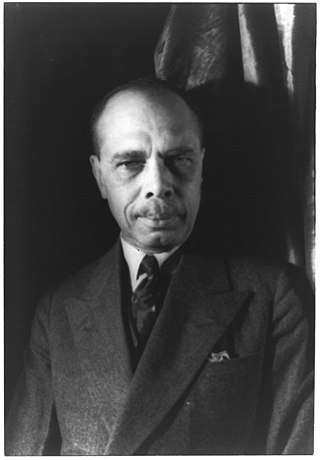
James Weldon Johnson was an American writer and civil rights activist. He was married to civil rights activist Grace Nail Johnson. Johnson was a leader of the National Association for the Advancement of Colored People (NAACP), where he started working in 1917. In 1920, he was chosen as executive secretary of the organization, effectively the operating officer. He served in that position from 1920 to 1930. Johnson established his reputation as a writer, and was known during the Harlem Renaissance for his poems, novel and anthologies collecting both poems and spirituals of Black culture. He wrote the lyrics for "Lift Every Voice and Sing", which later became known as the Black National Anthem, the music being written by his younger brother, composer J. Rosamond Johnson.
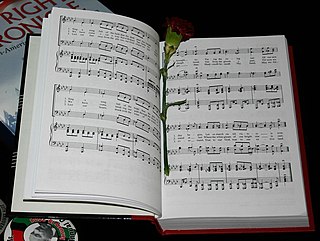
"Lift Every Voice and Sing" is a hymn with lyrics by James Weldon Johnson (1871–1938) and set to music by his brother, J. Rosamond Johnson (1873–1954). Written from the context of African Americans in the late 19th century, the hymn is a prayer of thanksgiving to God as well as a prayer for faithfulness and freedom, with imagery that evokes the biblical Exodus from slavery to the freedom of the "promised land."

Robert Allen Cole Jr. was an American composer, actor, and playwright who produced and directed stage shows. In collaboration with Billy Johnson, he wrote and produced A Trip to Coontown (1898), the first musical entirely created and owned by black showmen. The popular song La Hoola Boola (1898) was a result of their collaboration. Cole later partnered with brothers J. Rosamond Johnson, a pianist and singer, and James Weldon Johnson, a pianist, guitarist and lawyer, creating more than 200 songs.

Robert Todd Duncan was an American baritone opera singer and actor. One of the first African-Americans to sing with a major opera company, Duncan is also noted for appearing as Porgy in the premier production of Porgy and Bess (1935).

Harry Burleigh was an American classical composer, arranger, and professional singer known for his baritone voice. The first black composer who was instrumental in developing characteristically American music, Burleigh made black music available to classically trained artists both by introducing them to spirituals and by arranging spirituals in a more classical form. Burleigh also introduced Antonín Dvořák to Black American music, which influenced some of Dvořák's most famous compositions and led him to say that Black music would be the basis of an American classical music.

Abriea "Abbie" Mitchell Cook, also billed as Abbey Mitchell, was an American soprano opera singer. She performed the role of Clara in the premiere production of George Gershwin's Porgy and Bess in 1935, and was also the first to record "Summertime" from that musical.

African-American musical theater includes late 19th- and early 20th-century musical theater productions by African Americans in New York City and Chicago. Actors from troupes such as the Lafayette Players also crossed over into film. The Pekin Theatre in Chicago was a popular and influential venue.

Not in Our Name is a jazz album by bassist Charlie Haden, recorded in 2004 and released by Verve Records in 2005.

"Boys the Old Flag Never Touched The Ground" is a patriotic song that was sung at events about the Medal of Honor recipient Sgt. William H. Carney of the 54th Massachusetts Volunteer Infantry. The song was written by Bob Cole, James Weldon Johnson, and J. Rosamond Johnson and was sung in their Broadway musical "Shoo Fly Regiment." It was published in 1901. They dedicated the song to Carney.
This is a timeline of music in the United States from 1880 to 1919.

This Is America is the third studio album by Kim Weston. Released in 1968, the album focuses on the theme of patriotism. It is well known for its recording of "Lift Every Voice and Sing", later released as a single.
Lift Every Voice may refer to:
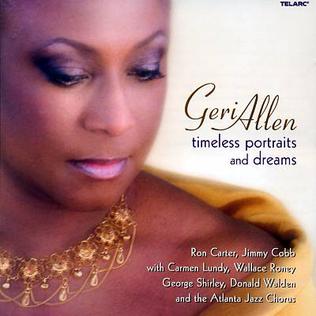
Timeless Portraits and Dreams is an album by pianist Geri Allen recorded in 2006 and released on the Telarc label.

Rapture is a live album by multi-instrumentalist Joe McPhee's Trio X featuring bassist Dominic Duval, percussionist Jay Rosen along with guest violinist Rosi Hertlein recorded at the Knitting Factory in late 1998 and released on the Cadence Jazz label.
Inez Clough (1873–1933) was a singer, dancer, and film actress in the United States during the early 1900s. Clough, an African American, was born on March 1, 1873, in Worcester, Massachusetts, and died on November 21, 1933, in Elgin, Illinois.

Lift Every Voice and Sing, also known as The Harp, was a plaster sculpture by African-American artist Augusta Savage. It was commissioned for the 1939 New York World's Fair, and displayed in the courtyard of the Pavilion of Contemporary Art during the fair at Flushing Meadow. The sculpture was destroyed along with other temporary artworks at the site after the closing of the exhibition in 1940.
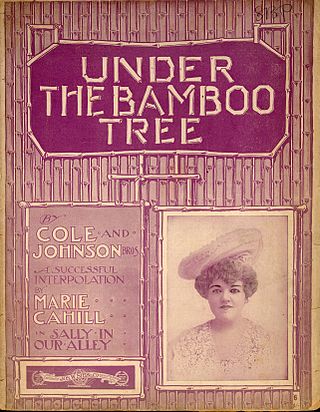
"Under the Bamboo Tree" is an American song composed by Robert Cole, J. Rosamond Johnson, and James Weldon Johnson. J. W. Stern & Co. published it in 1902. A ragtime hit, it sold over 400,000 copies.

The Red Moon is a musical or operetta in three acts with music by J. Rosamund Johnson and both book and lyrics by Bob Cole. Additional music was contributed by James Reese Europe who composed the song "Sambo" for the show, and co-wrote the song "Ada " with Cole and lyrics by Charles A. Hunter. Labeled and marketed by its creators as a "sensation in red and black", the work has been classified variously by theatre scholars as a musical and an operetta. The show was created by African Americans and starred an all-Black cast in its original 1908–10 production. The show is regarded as historically important to American theatre because it was the first Broadway show to depict alliances between African Americans and Native Americans.
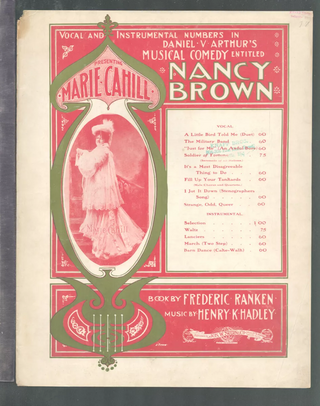
Nancy Brown is a musical in two acts with music by Henry Kimball Hadley and both book and lyrics by George Broadhurst and Frederic Ranken. The musical also used several songs written by the African-American songwriting team of Robert Cole, J. Rosamond Johnson, and James Weldon Johnson. Set in the royal palace of the fictional kingdom of Ballyhoo, the show was about the matchmaker Nancy Brown's attempt to wed the Ballyhooian royalty and nobility to eight wealthy American heiresses in order to save the financially bankrupt kingdom.


















